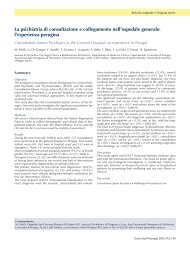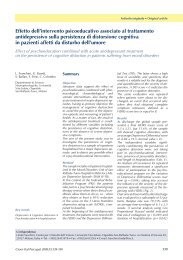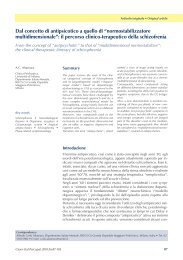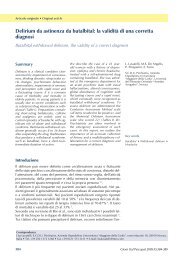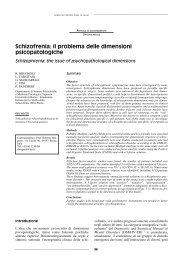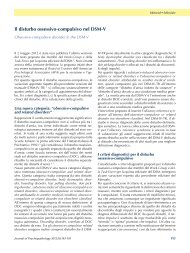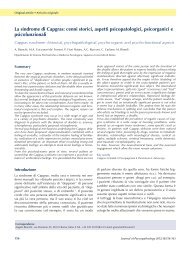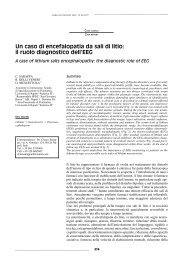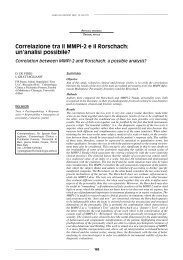XI Congresso della Società Italiana di Psicopatologia Psichiatria ...
XI Congresso della Società Italiana di Psicopatologia Psichiatria ...
XI Congresso della Società Italiana di Psicopatologia Psichiatria ...
Create successful ePaper yourself
Turn your PDF publications into a flip-book with our unique Google optimized e-Paper software.
Dopo aver descritto le patologie ginecologiche e gli interventi<br />
chirurgici possibili nelle fasi sopra elencate che, in<br />
modo rilevante, influenzano la sessualità femminile, vorremmo<br />
concludere sottolineando il bisogno <strong>di</strong> una specifica<br />
formazione universitaria e successiva educazione continua<br />
in me<strong>di</strong>cina che permetta l’elaborazione <strong>di</strong> raccomandazioni<br />
e linee guida inerenti alla sessualità, materia in continuo<br />
cambiamento ed evoluzione <strong>di</strong> grande incidenza sulla qualità<br />
<strong>della</strong> vita.<br />
Dalla prestazione alla sod<strong>di</strong>sfazione<br />
C. Simonelli<br />
Università <strong>di</strong> Roma “La Sapienza”, Facoltà <strong>di</strong> Psicologia 1<br />
Negli anni recenti la sessuologia ha mostrato un particolare<br />
interesse per due aree: lo sviluppo <strong>di</strong> sussi<strong>di</strong> farmacologici<br />
efficaci per il trattamento dei sintomi sessuali maschili, in<br />
particolare il deficit dell’erezione e l’eiaculazione precoce<br />
151<br />
SIMPOSI TEMATICI<br />
e, contemporaneamente, si è evidenziato, a livello internazionale,<br />
il bisogno <strong>di</strong> una revisione critica <strong>della</strong> nosografia.<br />
Le nuove proposte <strong>di</strong> classificazione, su cui non esiste ancora<br />
un consenso unanime, prendono in considerazione il personal<br />
<strong>di</strong>stress come elemento cruciale per la <strong>di</strong>agnosi e per l’eventuale<br />
intervento terapeutico: nel considerare non solo gli<br />
aspetti e i correlati fisiopatologici <strong>della</strong> risposta sessuale, stanno<br />
emergendo con maggior chiarezza gli aspetti del vissuto<br />
soggettivo e <strong>della</strong> <strong>di</strong>mensione sod<strong>di</strong>sfazione/insod<strong>di</strong>sfazione.<br />
Per promuovere una sessualità espressiva e libera da sintomi<br />
invalidanti è necessario tenere presenti i rischi <strong>di</strong> un’eccessiva<br />
me<strong>di</strong>calizzazione <strong>della</strong> prestazione e, parallelamente, capire<br />
meglio il <strong>di</strong>verso ruolo e vissuto maschile e femminile.<br />
Questo sviluppo <strong>della</strong> nostra <strong>di</strong>sciplina permetterà la messa a<br />
punto più incisiva <strong>di</strong> interventi su tre piani fondamentali:<br />
1)strategie <strong>di</strong> intervento preventivo efficaci e verificabili;<br />
2)<strong>di</strong>agnosi sempre più accurata delle <strong>di</strong>sfunzioni maschili e<br />
femminili;<br />
3)messa a punto <strong>di</strong> programmi <strong>di</strong> promozione <strong>della</strong> salute<br />
sessuale.<br />
24 FEBBRAIO 2005 - ORE 14.15-15.45<br />
SALA RODI<br />
S65 - Il glutammato e la sua neurotrasmissione: un<br />
bersaglio principale in psichiatria e psicofarmacologia<br />
Metabotropic glutamate receptors as novel<br />
target for Anxiety and Depressive Disorders<br />
F. Nicoletti, F. Matrisciano<br />
Department of Human Physiology and Pharmacology, University<br />
of Rome “La Sapienza<br />
Anxiety and depressive <strong>di</strong>sorders are the most commonly<br />
occurring of all mental illnesses, and current treatments are<br />
less than satisfactory. Hence, the <strong>di</strong>scovery of novel approaches<br />
to treat anxiety/depressive <strong>di</strong>sorders remains an<br />
important area of neuroscience research. Glutamate is the<br />
major excitatory neurotransmitter in the mammalian central<br />
nervous system, and G-protein-coupled metabotropic glutamate<br />
(mGlu) receptors function to regulate excitability via<br />
pre- and postsynaptic mechanisms. MGlu receptors form a<br />
family of eight subtypes that are sub<strong>di</strong>vided into three<br />
groups on the basis of sequence homology, pharmacology<br />
profile and transduction pathways. Group I includes the<br />
subtypes mGlu1 and mGlu5, which are coupled to inositol<br />
phaspholipid hydrolysis; group II includes mGlu2 and<br />
mGlu3 receptors, which are coupled to Gi proteins; members<br />
of group III (mGlu4, -6, -7 and -8 receptors) are also<br />
coupled to Gi proteins in heterologous expression systems.These<br />
receptors are a more suitable target for therapeutic<br />
intervention because they “modulate” rather than<br />
“me<strong>di</strong>ate” excitatory synaptic transmission. Agonist for<br />
group II (mGlu2/3) receptors and antagonists for group I (in<br />
particular mGlu5) receptors have shown activity in animal<br />
and/or human con<strong>di</strong>tions of fear; anxiety or stress. Neu-<br />
MODERATORI<br />
M. Popoli, A. de Bartolomeis<br />
roadaptive changes in the expression and function of<br />
mGlu2/3 receptors occur in response to chronic antidepressant.<br />
In ad<strong>di</strong>tion, neuroadaptation to imipramine – at least as<br />
assessed by changes in the expression of β 1 -adrenergic receptors<br />
– is influenced by drugs that interact with mGlu2/3<br />
receptors and stimulates further research aimed at establishing<br />
whether any of these drugs can shorten the clinical latency<br />
of classical antidepressants.<br />
Bibliografia<br />
1 Swanson et al., 2005.<br />
2 Matrisciano et al., 2005.<br />
MRS stu<strong>di</strong>es of cortical amino acid<br />
neurotransmitters in Depression<br />
G. Sanacora, D. Rothman, J. Krystal, G. Mason<br />
Yale University, New Haven, USA<br />
Objectives: increasing evidence suggests the amino acid<br />
neurotransmitter systems contribute to the pathophysiology<br />
and treatment of major depressive <strong>di</strong>sorder (MDD).<br />
Specifically, altered concentrations of both GABA and<br />
glutamate (glu) have been reported in plasma, cerebrospinal<br />
fluid and brain of depressed subjects. The primary<br />
objective of this series of stu<strong>di</strong>es was to use in vivo<br />
magnetic resonance spectroscopy to examine potential <strong>di</strong>fferences<br />
in the content of GABA and glu in the brains of<br />
depressed in<strong>di</strong>viduals.



